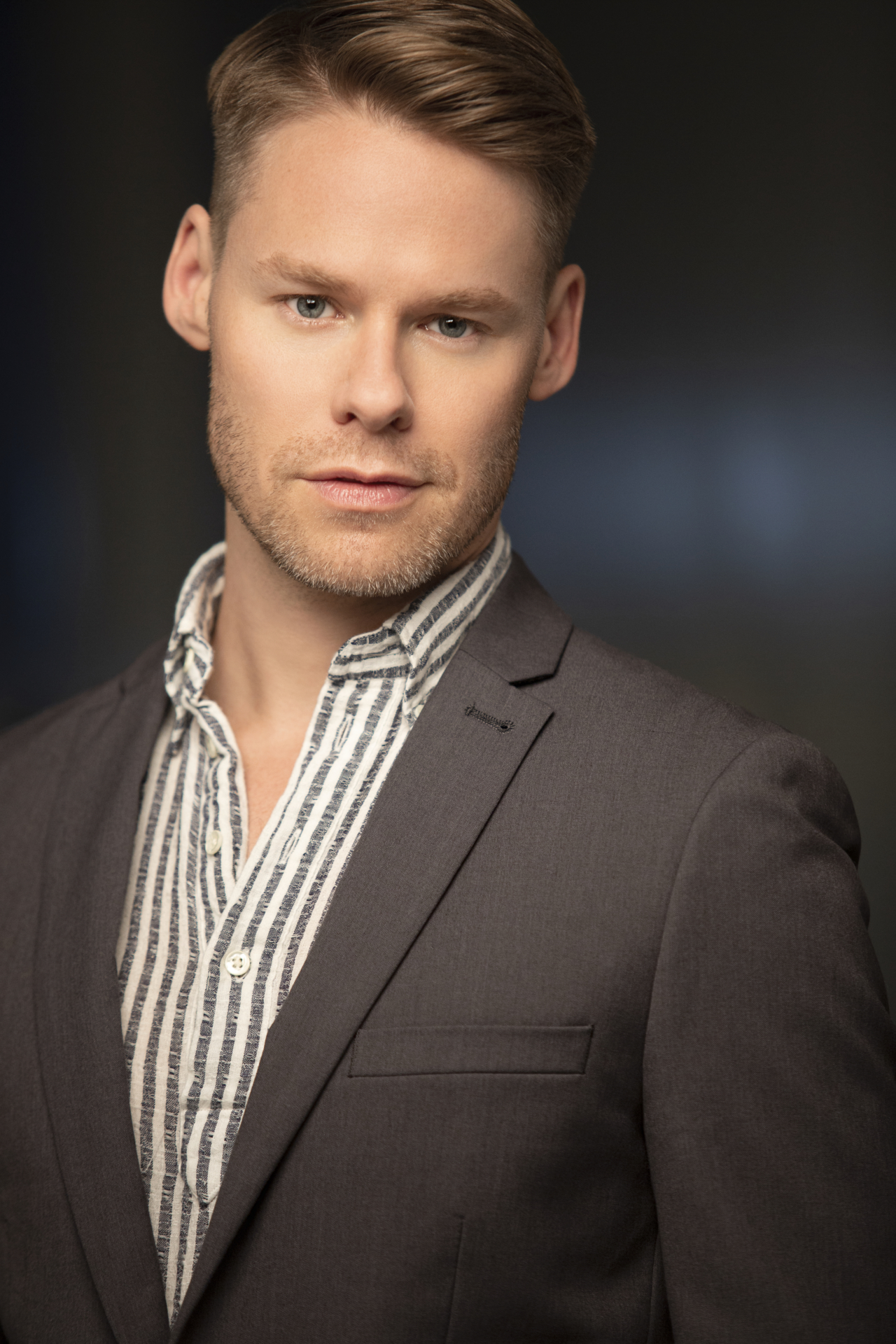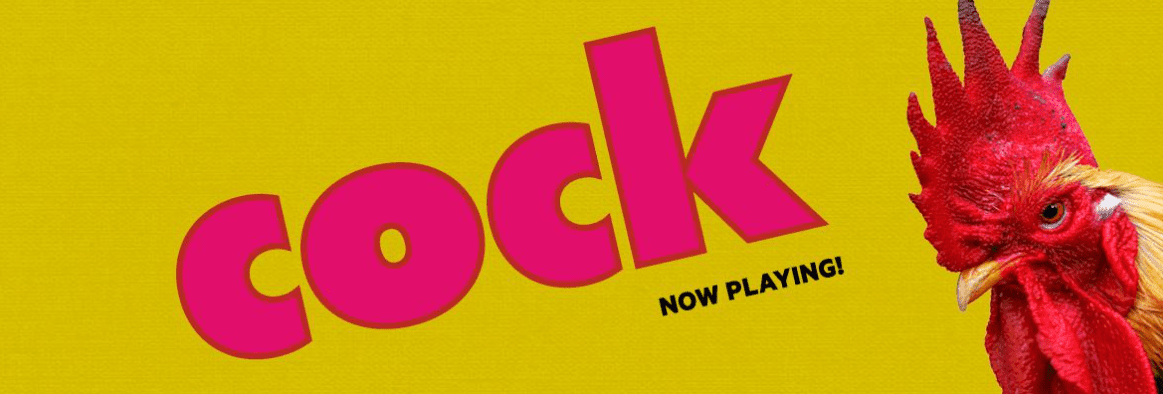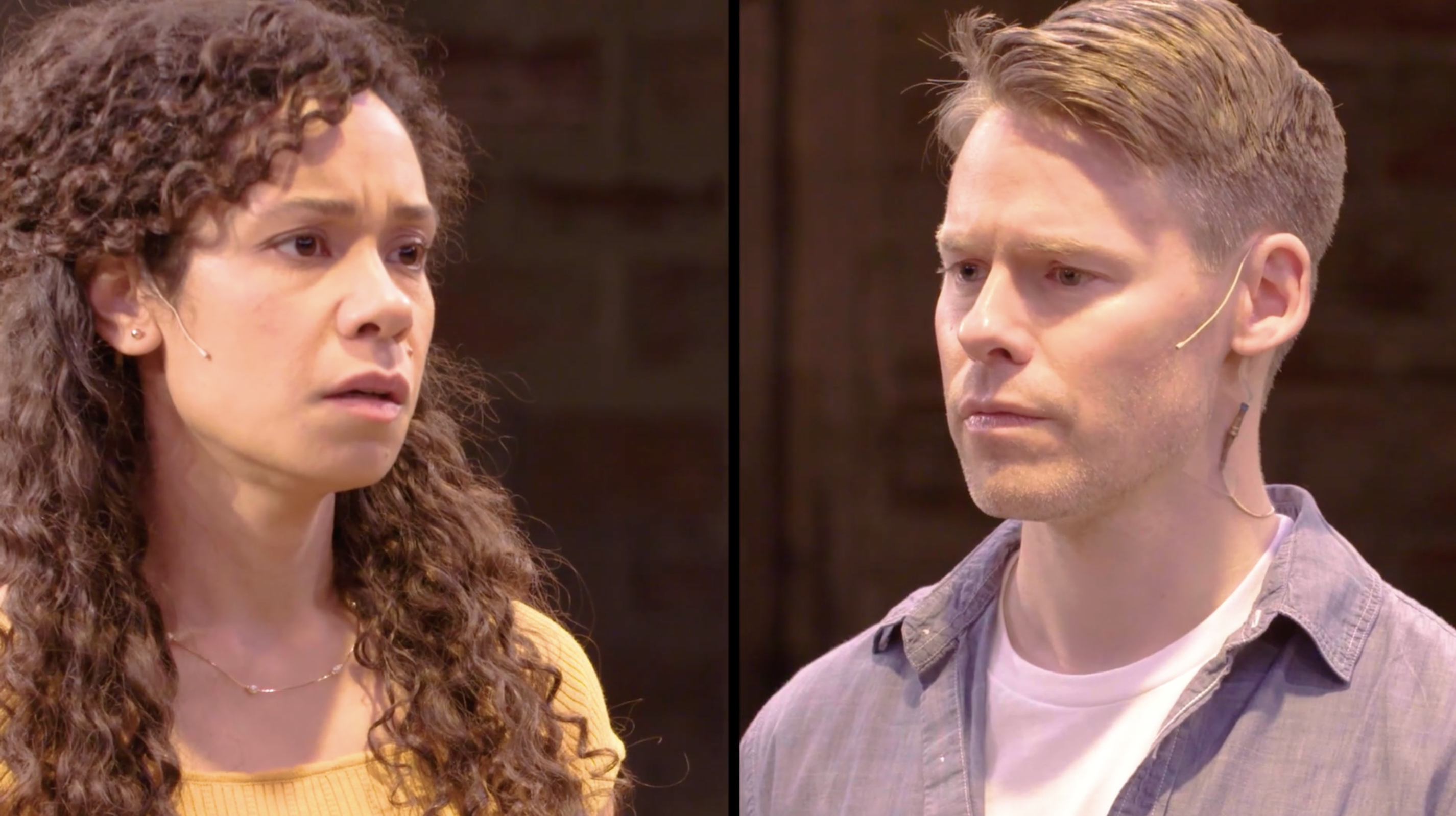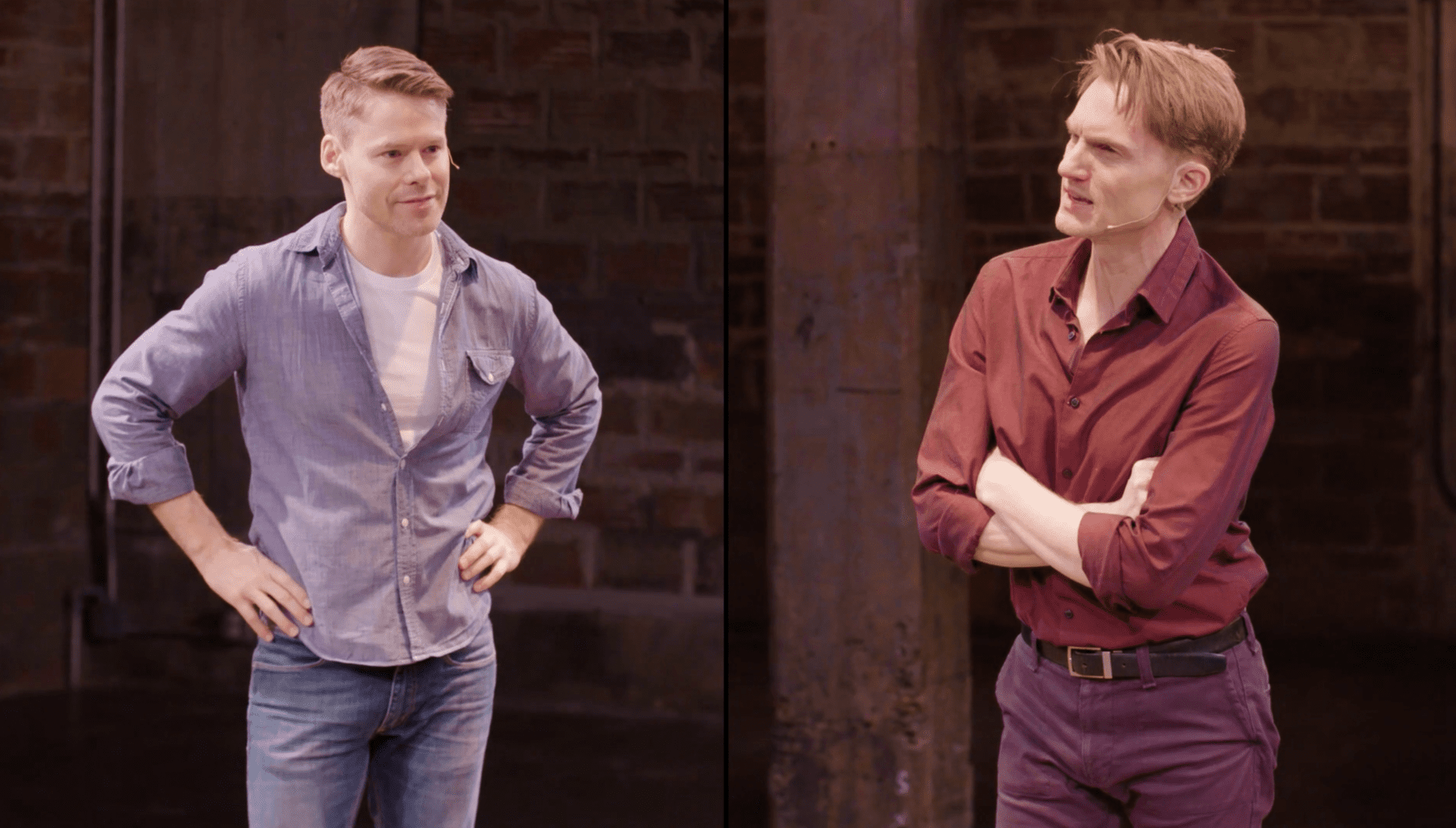After a year-long hiatus, Washington D.C.’s Studio Theatre has returned to offering theatre with its first production of the 2020-2021 subscription season – Mike Bartlett’s Cock. Directed by David Muse, Cock tells the story of John, a man wrestling with his sexual identity and the paralysis of choice, as two love interests vie for his affection. The production is available to stream on-demand through Studio Theatre’s website, studiotheatre.org, until April 18.
Playing the role of John is Randy Harrison, best known for his portrayal of Justin Taylor in Showtime’s hit series Queer as Folk. Harrison previously appeared at Studio Theatre in The Habit of Art, and some of his other theatre credits include roles in Wicked, Angels in America, Cabaret, and Sunday in the Park with George.
Instinct Magazine had the opportunity to chat more with Harrison about Cock, managing these days of COVID, and possible rumors of a Queer as Folk reboot.

Hi, Randy! Thank you for taking some time to chat with me about Cock. How does it feel to return to Studio Theatre?
I love Studio Theatre. I worked there about 10 years ago, and I love working in D.C. Cock is a very different context because it does not have an audience. You do not quite feel the theatre if you do not have the experience of performing for a specific audience, but I was happy to work with David Muse again, and I was happy to be back in D.C. to work at Studio Theatre. It is a great theatre.
Is Cock your first theatrical performance since before the pandemic?
Technically, yes. I have been doing Zoom readings, workshops with plays, and live streaming things, which is as close to any kind of theatre that has been happening during the pandemic. Cock is a hybrid of theatre and the streaming digital platform. It is the closest thing I have done since the lockdown.
How have you been coping during these days of COVID?
It has been different month to month [laughs]. Initially, like everyone, I thought it would be temporary. Certainly not over a year long. I had a gig lined up Off Broadway that was initially pushed a couple months, and yeah, it has been different. I am very lucky that I have a place upstate, so I had a place to escape. I think if I was stuck in an apartment in the city the whole time, it would have been more difficult. It felt safe, and I had some space and freedom upstate. I also had sort of a safe house for friends getting out of the city to avoid the dangers of that population density. I was able to not be that alone, considering many people were alone. I had a bunch of friends who came up from the city for about four months during the worst of the pandemic. It was good to get to be with people and be safe and isolated up there.
Professionally, I got bored. Besides a bunch of Zoom readings that have been a lot of fun, I went back to school. I am doing online school getting a second bachelor’s degree. That kept my brain working. I have also been doing a bunch of stuff with Justin Elizabeth Sayre through Dynasty Typewriter. Streaming things online has kept me in touch with my creativity to some extent.
What are you getting your second degree in?
Psychology. It seems like a logical transition from what I have been doing for 22 years.
Why did you want to be involved with Cock?
I love the play. I read the play whenever it was first published in 2009, and I am a fan of the Royal Court and a lot of the new material that comes out of that theatre in London. I tend to read most of what comes out of there, and the subject matter certainly appealed to me. I love Mike Bartlett’s use of language; it is just so minimal but powerful. I always wanted to do the play, and I auditioned for it back in the day once or twice, but never got the opportunity to do it. So, when David Muse from Studio Theatre contacted me and asked me to do it, I jumped on top of it.

How would you say Cock is different from any other production you have been in?
This specific production is different because this is the first time all these theatre artists have been in a theatre together in a year. I think everybody was well aware how lucky we were to go back in a theatre, and we are very grateful to be in a room with other actors and artists again after the live performance medium has been decimated by the pandemic. That changed things, and then the way it was a hybrid of theatre and streaming, we rehearsed in a traditional theatre way. We rehearsed for about four weeks in a room together, and there were some holdups because of testing and COVID protocols, so we rehearsed a little bit over Zoom, but also in person.
Then we shot it in one day, which is really different. Usually for film or television, you would not rehearse at all. You would rehearse for a few minutes or an hour before they set up lights, but you would shoot a script of its length over two weeks or something. The length of the text would be shot over a prolonged period of time with no rehearsal. I often wanted to have an opportunity to shoot something that is rehearsed longer, so it is just an interesting hybrid. It is like nothing else and may be like nothing that continues to exist once theaters reopen. Those aspects make it very unique.
Do you know how the show has been received by audiences?
No, but I have friends who have reached out to me saying they enjoyed it. That is all I know!

What do you hope audiences take away from the show?
I hope they think. To me, the show raises an interesting question about identity. On the surface, it is about sexuality, but underneath it all and the main conflict my character, John, is facing is this notion of identity. The idea that we tie our sense of identity to identifiers that may change and can change environmentally. When they do, sometimes we lose our sense of identity. Thinking about the instability of identity, the fact that we can change throughout our lives, and things that we consider solid can change whether it be gender or sexuality. Beyond that, John talks about feeling like he is two different people with his two partners. I think that is a reality all of us have. We are different people in different social contexts. Like, when I am with this group of people, I’m this guy. When I’m with this group of people, I’m that guy. Thinking that, it’s not like a deception, it is not like you are two different people, but you encompass all of it. I hope the play makes people think about all of that and the expansiveness of identity.
The pandemic has changed the way of life so much. What do you think the future of live theater will look like? Do you think we will continue to have virtual performances and events?
I think so. I do not think anything can or will replace live performance. People need to be in a room together someday again, and I think the pandemic will increase the demand for people being in a space together. Once people feel safe doing it, I think people are going to be anxious to be in a room together to laugh, cry, and applaud together. At the same time, theater and live performance is a hard business in this country. It is a hard way to make a living, theaters have a hard time staying afloat, and I think streaming mechanisms are a useful tool in keeping audiences engaged. It is a useful tool in getting larger and more expansive audiences involved.
As an actor, I did Queer as Folk 20-something years ago and got a fan base all over the world because the show was distributed all over the world. As a theatre actor, which is mostly what I have been for 20 years since Queer as Folk, it has limited the kind of people who can see my work. I think viewing something that is streamed, again, there are a lot of people who get to see my work that have not seen it in a long time. I think that can be a real benefit for theaters to be able to reach wider audiences. When people travel, they might be more likely to see a play in this other theater because they streamed something that the theater produced. I am hoping it can continue to happen as a useful tool for keeping live performance venues alive and more expansively engaged with their audiences.
With Broadway still being dark, have you been doing anything to help your fellow performers during these times?
Besides running a halfway house for performers upstate? [Laughs]. A lot of the readings we do are benefits. Everything I have been doing with Justin Elizabeth Sayre, a lot of that money has gone into keeping these performance venues up and running. The main thing I am doing is donating my time.

Have you always had a passion for acting?
I have for very, very long, I started when I was like eight or nine in community theater. I remember the first play I ever saw; I was sort of obsessed right away with the idea of the proscenium. I was a child, I was like five, and I saw Peter Pan and people were flying. It became this magical world to me that I always wanted to be involved with. By the time I was old enough to realize the magic was fake, it was my world. It was my home.
Now, I must ask you a couple questions about Queer as Folk. Any more word on a possible reboot?
No, and people always ask us this. I think one was happening, but it fell through. I don’t really keep up on it. If there’s not a contract on my desk, it’s all made up as far as I’m concerned. We do see each other periodically. Right at the beginning of the pandemic, we all did a reunion benefit. We have little reunions every couple of years, and we all stay in touch, but I do not know how or why a reboot would happen.
There was The L Word reboot, but I think that property is different because Showtime initially owns that property. It was developed for Showtime, whereas Queer as Folk was a British property that was temporarily purchased. Since Showtime does not own it, there is no financial benefit for an American reboot. I also cannot imagine people being that interested. There is not a huge market for stories about people over 50 in this country.
If a reboot did happen, what direction would you like to see the show head towards, and what changes would need to be made for the show to be successful today?
Inclusion would be a big thing. The show is extraordinarily white and very mononormative in a way. There needs to be trans characters, there needs to be a lot more racial diversity – I think that would be an important beginning to make the show more relevant now. These are stories about intersectionality that need to be told. I think breaking the heteronormativity of the original Queer as folk and the culturally and racially homogenous world would be a beginning.
Beyond that, gay sex life has changed so much because of PrEP and apps. The show was pre-app and pre-PrEP. I think it would really change, and I think there are more sophisticated ways of discussing relationships. Yeah, there’s a lot. There is still so much to talk about, and I am a firm believer that there will never be enough media and art about the gay and queer experience. I miss those stories, and I still wish there were more. I know it has gotten a lot better, but I want more.
What do you think Justin would be up to these days? Is Brian still in the picture?
I have no idea [laughs]. I did not write the character. I only played it, and it is unfair of me to ask to write the character now. I remember in one interview, I was like, he’s dead. Justin died. Everybody was so upset, and I am like, you guys, he’s fictional! Why are you asking me? What do you think? You can write it. I mean, I feel like Justin wanted a more traditional life than Brian wanted. I feel like he probably has that now, somehow. I don’t know if he is married with children. I often say, he is in the suburbs of New York working in an art adjacent field. Not fine art, but graphic design for a media company or something where he is artistic. I really do not know. No matter what I say, people are going to be mad because they only want to say he moved back to Pittsburgh and is married to Brian. To me, that was not a healthy dynamic for a child to be in a relationship with a 30-year-old man.
Justin was your debut television role. Why did you audition for the part, and what did you take away the most from this experience?
Oh my God, so much. I auditioned for it because I knew about the British series and I wanted to play gay characters. I wanted to be a part of visibility. Growing up, I was out when I was about 16 in Georgia in the 90s, and I was hungry for representation for gay characters. I was lucky enough to have found Larry Kramer, Angels in America – every bit of gay media that I could find, I soaked up. It was so powerful to me. Even in college, I did a production of Shopping and Fucking, and I did Hello Again, and I was playing gay characters. I wanted to play characters.
When I knew that this show was going to be produced for an American audience and there was a role of a young kid, I knew I was right for the role. I know how young I looked. I was 21 or 22 when we started shooting. I read the script, and I wanted to do it. I mean, who wouldn’t? I did not have ideas of being some straight passing movie star. I knew I was a queer artist and I wanted to be a part of a large media representation of a gay person. I wanted to play a gay person for young gay people to watch.
Playing Justin meant everything to me, but it was certainly overwhelming at the time. I think I thought I could handle even a little bit of fame or whatever it was that happened at the time, but I was overwhelmed by being recognized. It is hard when you are young and still figuring out who you are to suddenly be somebody else to the larger population. As I have gotten told and built a career and solid identity separate from Queer as Folk, it has become extraordinarily obvious to me what a blessing it was to have an opportunity to do this. To have an opportunity to do something that meant so much to so many people. I am grateful to have been a part of it.
It is still hard to process when you get a DM or see someone at a stage door telling you something so personal about how you have helped them come out, helped them facilitate a conversation with their parents, helped them realize they are gay, or helped them realize they can be gay and have a happy life. All because of a job you had 20 years ago. It is almost impossible to absorb and really understand, but I feel so lucky.

Several actors in Queer as Folk are straight. What are your thoughts on the recent debate about straight actors playing LGBTQ roles?
I love all the actors of Queer as Folk and I thought they all did an awesome job, but as an audience member, I would rather watch gay people play gay roles. I was just reading an interview with Ryan Spahn, and he was talking about how there has only been one gay actor ever nominated for an Oscar for playing a gay role. Ian McKellen for Gods and Monsters. However there has been like 65 plus straight actors nominated for playing gay and trans roles. As a gay actor, I am well aware of the difficulty in finding work as a queer performer. I am well aware of facing homophobia in the casting process. I am well aware of how limited we are perceived as artists by heterosexual communities.
I am anxious for more opportunities. I want to see gay, trans, queer, nonbinary people all over the media, especially playing themselves. It is not the straight actor’s fault. It is the culture as a whole that raises their work above that of queer people. It can be very frustrating when a queer person is denied the opportunity to play a queer role, especially because it means something different. It is just a shame they are denied those opportunities.
What more do you hope to accomplish with your platform?
In a way, the opportunity to do Queer as Folk, I am aware that the representational and political significance of my career may never go beyond that as far as scope. Creatively and artistically, I have smaller goals that I have been focused on for the past 20 years. Those shift constantly, and they have a lot more to do with personal fulfillment than any large moral or political theories that I hope to accomplish. Mostly, it is about material and working with different people, and it has taken me a long time to realize that one of the things I value the very most about being an actor is the collaborative process. I do not think people who are in other industries get the opportunity to work as intimately and personally with other people about things that are of spiritual, moral, political, and personal significance to all of them. It is this gift that you have.
Before we wrap up, are there any other upcoming projects or anything else you would like to mention our plug?
I am doing a reading of Babette in Retreat that is going to be on Play-PerView on April 10. It is by Justin Elizabeth Sayre, and Mary Testa, Nathan Graham, Becca Blackwell, and Jack Wetherall will be in it. It is a great cast.
Stay up-to-date with Harrison by following him on Instagram.
Visit studiotheatre.org for more information on Cock and to purchase tickets.
Photos Courtesy of Studio Theatre

